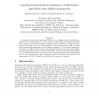Free Online Productivity Tools
i2Speak
i2Symbol
i2OCR
iTex2Img
iWeb2Print
iWeb2Shot
i2Type
iPdf2Split
iPdf2Merge
i2Bopomofo
i2Arabic
i2Style
i2Image
i2PDF
iLatex2Rtf
Sci2ools
148
click to vote
EC
2010
2010
Learning Factorizations in Estimation of Distribution Algorithms Using Affinity Propagation
Estimation of distribution algorithms (EDAs) that use marginal product model factorizations have been widely applied to a broad range of, mainly binary, optimization problems. In this paper, we introduce the affinity propagation EDA which learns a marginal product model by clustering a matrix of mutual information learned from the data using a very efficient message-passing algorithm known as affinity propagation. The introduced algorithm is tested on a set of binary and non-binary decomposable functions and using a hard combinatorial class of problem known as the HP protein model. The results show that the algorithm is a very efficient alternative to other EDAs that use marginal product model factorizations such as the extended compact genetic algorithm (ECGA) and improves the quality of the results achieved by ECGA when the cardinality of the variables is increased.
Related Content
| Added | 02 Mar 2011 |
| Updated | 02 Mar 2011 |
| Type | Journal |
| Year | 2010 |
| Where | EC |
| Authors | Roberto Santana, Pedro Larrañaga, José Antonio Lozano |
Comments (0)

